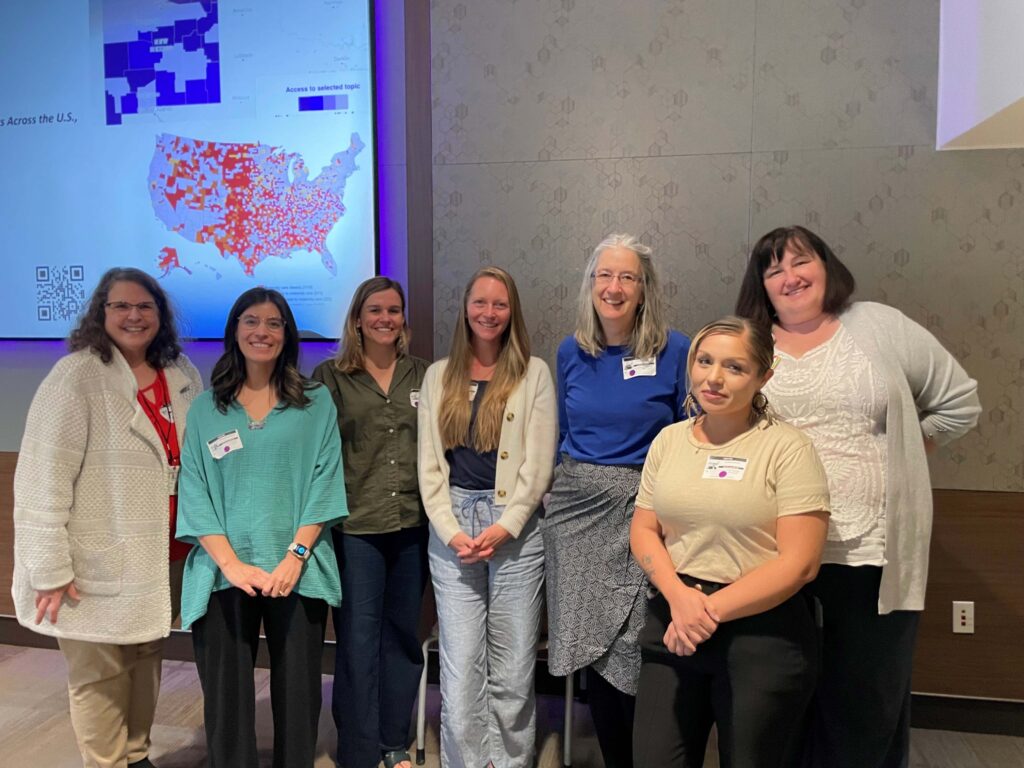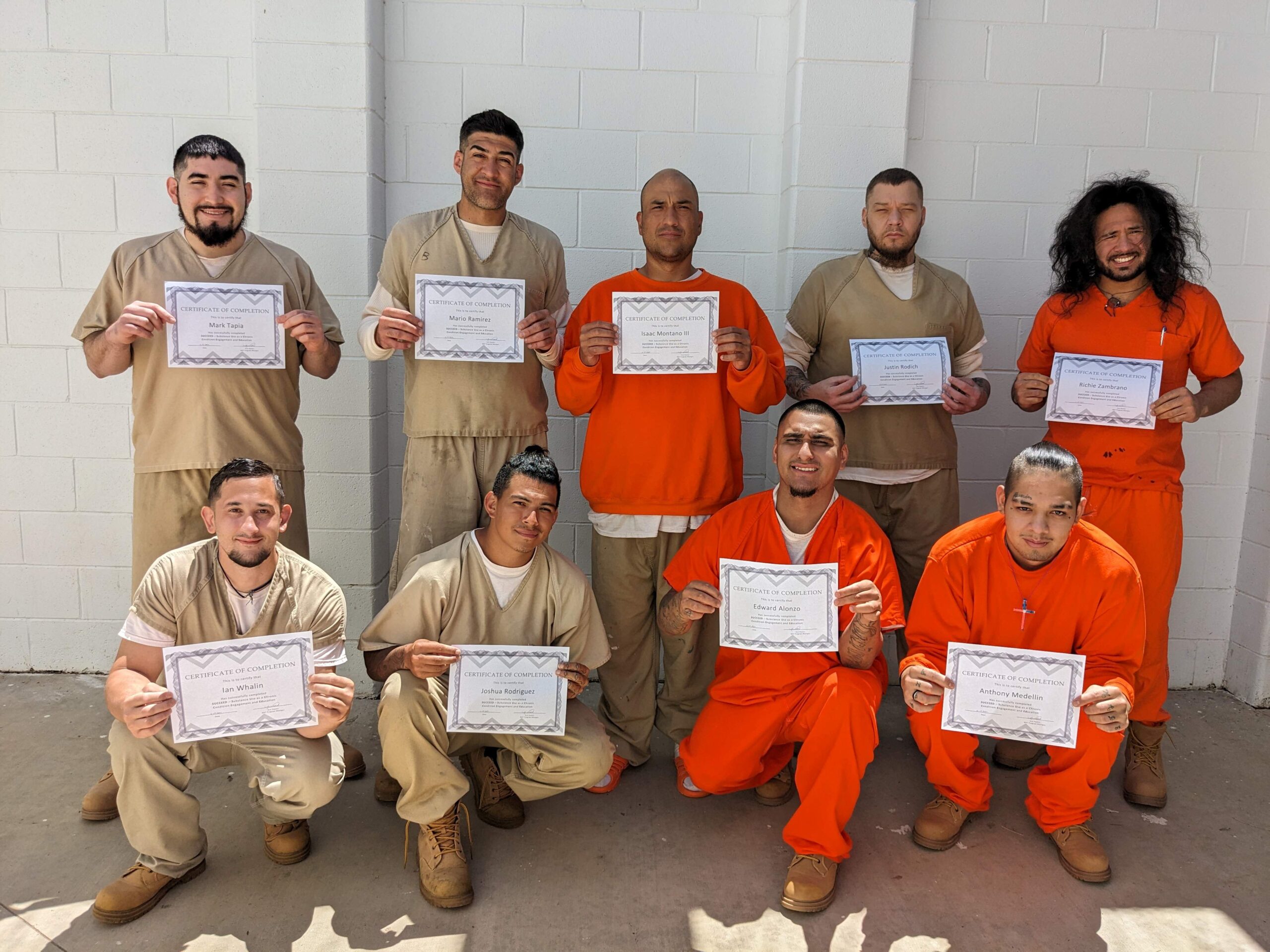In 2023, New Mexico reported 948 overdose deaths, driven by the rise of fentanyl and limited access to treatment for substance use disorders in rural communities. Recognizing a critical need, Project ECHO is expanding access to evidence-based treatment, intervention and prevention strategies for substance use disorders.
ECHO is focused on closing the care gap for two of the state’s most vulnerable populations: pregnant people and people in detention centers.
Bringing Treatment Inside New Mexico’s Jails
One critical point of intervention is in New Mexico’s detention centers. Designed for short periods of detainment, county jails are not equipped with same opioid treatment systems as prisons.
Project ECHO’s New Mexico Substance Use Disorders in Detention Centers program is helping to bridge this gap, providing the training and support needed to implement effective medication-assisted treatment (MAT) programs in jails—a proven method to reduce overdose deaths and recidivism rates.
By connecting medical and behavioral health staff with addiction specialists, public health experts and legal advisors, ECHO helps detention centers build evidence-based medication for opioid use disorders (MOUD) programs—and shift perceptions about what effective treatment looks like.
For Kris Paulus, MAT program manager at Roosevelt County Detention Center, participating in Project ECHO has given her tools and support to overcome key challenges.
“Before ECHO, stigma was our biggest hurdle—both among staff and detainees,” Paulus shares. “We also struggled with the logistics of scheduling, medication distribution and balancing the needs of medical and security teams. Attending ECHO sessions helped us find solutions that work in real-world jail settings.”
Every year, thousands of people are released from county jails across New Mexico—many battling opioid use disorder. Research shows that the risk of overdose is highest shortly after release, with formerly incarcerated people facing a 10- to 40-times greater likelihood of overdose death compared to the general population[1].
From a medical perspective, Kim Johnson, a registered nurse at Roosevelt County Detention Center, sees the shift as well. “Screening for MAT and MOUD starts upon intake with protocols to best tailor to each individual’s needs to include detox, medications, coordination of care for community, rehab or corrections.”
And the impact?
“When stable on their medication, detainees are more engaged in programming, better able to focus, and have an opportunity to develop new coping skills,” says Paulus. “They start to see that substance use doesn’t define them. MOUD is a tool—just like medication for diabetes or hypertension—and for many, that realization is life-changing.”

Detainees at the Roosevelt County Detention Center care for the baby chicks they’ve raised, which are now laying eggs. As part of their rehabilitation efforts, they are also actively gardening and using fresh produce and eggs to prepare meals, fostering valuable skills in sustainability and self-sufficiency. Photo Credit: Kris Paulus, Roosevelt County Detention Center, April 2024.
Nevertheless, finding ways to connect people to continued support after release is a challenge. “We need more community resources in rural areas to continue therapy, counseling and medication access,” says Johnson. “ECHO is invaluable because it connects us to knowledge, but systemic change is still needed.”
Supporting Pregnant People with Opioid Use Disorder
Nearly half of pregnancy-related deaths in New Mexico are related to substance use. And, babies exposed to opioids in utero can become addicted, requiring specialized care upon birth. Unfortunately, New Mexico has also seen a steady rise in these cases of neonatal abstinence syndrome.
The stakes are high, but pregnant people are often too afraid to seek help.
For Desiree Bustos, a certified peer support worker and harm reduction specialist in Española, Project ECHO’s New Mexico Substance Use Disorders in Pregnancy program has given her the knowledge and confidence to help pregnant people access life-saving care without fear or shame.

An aerial view of Española, New Mexico, a rural community deeply affected by the opioid crisis. Limited health care resources and provider shortages make access to treatment and support services critical for those impacted by substance use disorder. Photo Credit: Adobe Stock
“Hearing different perspectives and learning from specialists has changed the way I approach my work,” says Bustos. “ECHO gave me the tools to advocate for my patients and connect them to the right resources.”
Bustos recalls a pregnant client who was using substances, and couldn’t find housing or medical care. “Before ECHO, I might have just referred her to the nearest hospital,” says Bustos. “But, because of what I learned in ECHO, I helped her find stable housing, coordinate prenatal care and, ultimately, deliver in a supportive environment.”
These meaningful, life-changing interventions are what drive her work.

Desiree Bustos (front right), certified peer support worker and harm reduction specialist at El Centro Family Health in Española, joins fellow members of the New Mexico Perinatal Collaborative (NMPC) at NMPC’s MOUD in Pregnancy Training, a regional training to reduce stigma in caring for pregnant and postpartum people with SUD and to increase access to MOUD in rural areas of the state. Photo Credit: New Mexico Perinatal Collaborative, April 2024.
“The providers, the patient—everyone was happy with the outcome,” she says. “And that’s because I had the knowledge and connections to get her where she needed to be.”
Fighting Stigma and Expanding Harm Reduction Approaches
One of the biggest barriers to care is stigma—from medical providers, the justice system and within communities. Through ECHO’s case-based learning, providers gain practical strategies to engage patients without judgment and implement harm reduction strategies.
“People hear ‘harm reduction’ and assume it’s just about Narcan or clean syringes,” says Bustos. “But it’s so much more than that. It’s about meeting people where they are and helping them take the next step forward.”
A Call for Continued Support
Since 2021, New Mexico has reported a slight decline (8%) in the number of overdose deaths, but there is still much work to be done.
“If we want better outcomes, we need system-level change,” says Bustos. “The knowledge we gain through ECHO is helping individuals build healthier futures—and that impact extends for generations.”
Join the no-cost ECHO Programs referenced in this story through iECHO.org. Register for the New Mexico Substance Use Disorder in Detention Centers or New Mexico Substance Use Disorder in Pregnancy. For more information on Project ECHO’s impact in New Mexico, email the program team.
Featured image: Detainees at the Roosevelt County Detention Center celebrate their achievement after successfully completing the SUCCEED curriculum, a program designed to equip them with valuable life skills and support their path to rehabilitation and reintegration. Photo Credit: Kris Paulus, Roosevelt County Detention Center, August 2024.
[1] Substance Abuse and Mental Health Services Administration, 2019
Originally published in March 2025, this story was updated in January 2026 to add credit to the authors.



